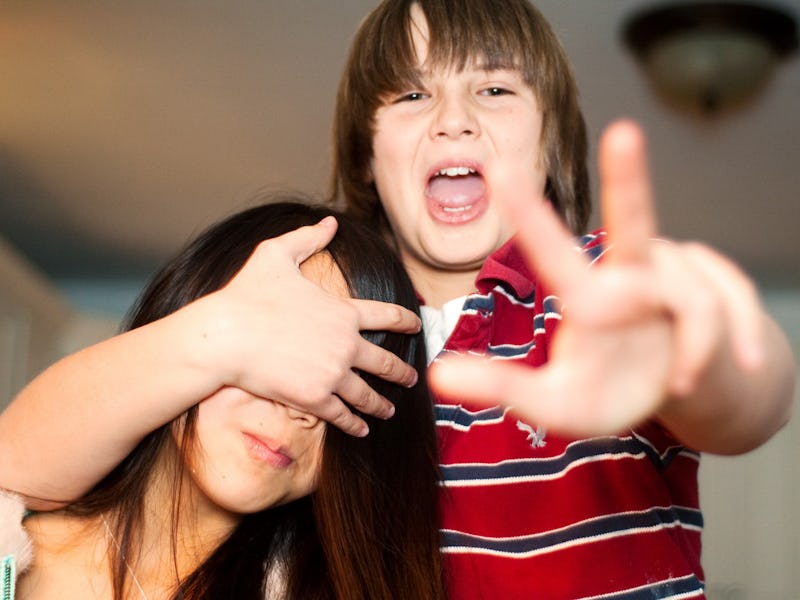You're Doomed to a Love/Hate Relationship With Your Siblings
Most of us broker a fragile peace.

It’s a scene that Sybil Hart has seen thousands of times. An infant — about six months old — plays happily with his mother nearby. He’s never had a sibling or other rival for his mother’s affection. But the second she turns her attention to a baby doll, that child drops whatever had his attention and returns to mommy.
“It’s so predictable that it’s stunning,” she says. “You put that doll in the mother’s arms, and the kid goes, ‘Hey!’ The first thing he does is run over there and say, ‘Hey, what about me?’ And then some of them protest. But the initial response — it’s almost like they all went to the UN and decided together: you see a rival, you bolt; you hop on that lap; you stake out your territory.”
Hart is a professor of human development and family studies at Texas Tech University, where she researches the relationships of infants and young children with parents and siblings.
Infants are hardwired to demand exclusive treatment from their mothers, she says. Through human evolution, babies needed access to their mothers’ breast milk for at least the first two years of life, or they would probably die. The birth of a younger sibling for an infant was literally a mortal threat, and in that context freaking out a little is pretty understandable.
How do you make kids get along when one is programmed to see the other as an invading enemy? It’s hard to say how that transition takes place, but it’s easy to see that it happens, says Hart. Well-adjusted children tend to overcome jealousies and become fast friends with their siblings.
We usually think of jealousy and rivalry as two sides of the same coin, but in Hart’s view, they are quite different and quite separate. Jealousy comes with a demand for exclusive attention — that your mom put down the baby and pay attention to you. But rivals see themselves as equals, and they are concerned with fairness. As long as both kids get the same number of minutes with mom, both are happy.
Hart expected to be able to track an evolution in older siblings from jealousy to rivalry, but what she is finding instead is more complicated and interesting. It doesn’t seem that one thing develops into another, but that they are separate and not necessarily mutually exclusive phenomena. The expectation that siblings be treated equally might be just as hard-wired as the impulse to interpret the birth of a sibling as a threat.
Friendship and rivalry can coexist, and in fact that is the normal state of affairs for healthy sibling relationships. If siblings are friends, it’s not because they have lost their rivalrous instinct, but because they have brokered peace on the condition that they continue to share in their parents affections equally.
“Anytime you see grown up siblings suing each other in court, what you’ll see is a large family fortune, a lot of money to be divvied up, and it brings up a lot of rivalry, and it’s as vicious as it is even in children,” says Hart. “It just doesn’t come up very often because most families don’t have that much money that it really causes that much of a problem.”
Despite the jealous reactions of young children to babies vying for mom’s affection, there’s no indication that kids actually ever need their caregiver’s exclusive attention. As long as there’s enough food to go around, kids separated by a year or less do as well as those separated by several years. First children, middle children, and youngest children all turn out pretty much the same. And twins, who never enjoy exclusive access to mom, do fine, too.
Twins have no choice but to learn to share, and they turn out OK.
When it comes to older siblings accepting new babies into their homes, there’s even more reason to be hopeful. Kids might be hardwired to be jealous, but they also appear to be hardwired to be loving and helpful big sisters and brothers.
“One day we were running this adorable little girl subject, and when we were done, it was time to go home and this little girl would not relinquish the toy,” Hart recalls. “So, the mother is looking mortified with embarrassment, the graduate student is looking at me with panic, like, ‘We’re about to have a temper tantrum; I don’t know what to do, Dr. Hart.’ And somehow, I just looked at this little girl and said, ‘Oh, that’s a nice toy! Would you like to give it to the baby?’ This girl leaped to her feet, ran over to the crib, and tippy-toed as high as she could so she could drop the toy into the crib, and left happily with her mother.”
This serendipitous moment has become a new area of study for Hart. She has found that even kids who stubbornly refuse to tidy their toys will jump at the chance to fetch a bottle for the baby. “As long as the mother includes the child in taking care of a baby, it seems to work,” she says. “As long as she’s got her back turned to the child, and she’s just taking care of the baby, it seems to be hard on them.”
Humans are social creatures who need to get along with each other to survive; that’s particularly true in the early years of life. It’s not always easy to like your siblings, especially if you don’t feel like you’ve been treated fairly. And yet it seems that at a deep level we all really just want to be friends.